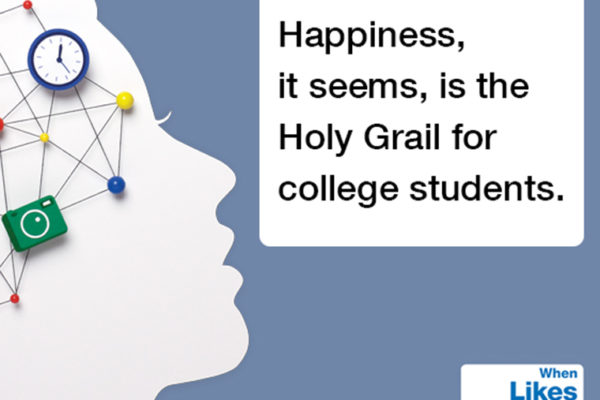Bono debut book tackles strategies for happiness
How can we be happier? In a world where stress, anxiety and bad days can easily overtake the good, Washington University happiness expert Tim Bono strives to answer that question in his book, “When Likes Aren’t Enough: A Crash Course in the Science of Happiness.”
Big data, big interest
Crunching big data, especially from social networking sites, is one of the hottest areas of study in business schools right now. A new center at Washington University in St. Louis is teaching students best practices when it comes to data mining and analysis. Seethu Seetharaman, PhD, the W. Patrick McGinnis Professor of Marketing, is the center’s director.
Internet, social media expose youth to tobacco
Although tobacco companies are barred by law from advertising their products to children, researchers at Washington University School of Medicine have found that many teens and pre-teens are getting tobacco advertisements and promotions through social media outlets or text messaging on mobile phones. More than one in 10 children under 18 reported receiving tobacco coupons or promotions on their Facebook or MySpace pages or in text messages.
Local health departments find Twitter effective in spreading diabetes information
Twitter is proving to be an effective tool for local health departments in disseminating health information — especially in promoting specific health behaviors. The latest study, led by Jenine K. Harris, PhD, assistant professor at the Brown School, focused on diabetes, a disease that may affect an estimated one-third of U.S. adults by 2050. “We focused on diabetes first, both because of increasing diabetes rates,” Harris says, “and also because people living with diabetes tend to use online health-related resources at a fairly high rate and are an audience already online and on social media.”
Three challenges for the First Amendment
A group of some of the country’s top scholars in First
Amendment law recently gathered at Washington University in St. Louis to discuss pressing challenges
being faced by the first of our Bill of Rights. Three issues rose to the
top of the list for Washington University’s first amendment experts:
free expression in a digital age; impaired political debate; and
weakened rights of groups.
New Year’s resolutions: 13 for ’13
As the holidays draw near, expect the usual onslaught of well-intentioned suggestions for lifestyle changes guaranteed to
make you healthier, wealthier and wiser in the new year. Talk is cheap, but these 13 New Year’s resolutions for 2013 are backed up by decades of research. If your resolve needs strengthening, click through the embedded web links to learn more
about the research behind the resolutions, including tips on using your
smart phone to quit smoking and the best way to pay down your holiday
debt.
Social media auto-overshare to meet its demise in 2013, says privacy law expert
Everyone knows someone who overshares on social media,
from constant updates about daily minutiae to an automatically generated
stream of songs listened to, articles read, games played and other matters blast-broadcast through various applications. Intentional
over-sharers may be a necessary nuisance in our wired world, but the
days of the auto-generated social media stream may be numbered, says
Neil Richards, JD, privacy law expert and professor of law at Washington
University in St. Louis.
Privacy law expert warns of the perils of social reading
The Internet and social media have opened up new vistas for people to share preferences in films, books and music. Services such as Spotify and the Washington Post Social Reader already integrate reading and listening into social networks, providing what Facebook CEO Mark Zuckerberg calls “frictionless sharing.” “But there’s a problem. A world of automatic, always-on disclosure should give us pause,” says Neil M. Richards, JD, privacy law expert and professor of law at Washington University in St. Louis.
Twitter subpoenas a challenge to intellectual privacy
The City of New York recently subpoenaed a Twitter account as part of an ongoing Occupy Wall Street criminal case. The Occupy protester named in the case is challenging the subpoena. Privacy law expert Neil Richards, JD, professor of law at Washington University in St. Louis, says that it’s not surprising that law enforcement groups are interested in accessing the volume of records relating to our speech that social media platforms generate. “By and large, this data should remain private, and online companies should keep the data confidential and not share it any more broadly than we as users and speakers want it to be shared,” Richards says.
Study looks at how kids with autism spend their screen time
Children with autism spectrum disorders (ASDs) tend to be preoccupied with screen-based media. A new study by Paul Shattuck, PhD, assistant professor at the Brown School at Washington University in St. Louis, looks at how children with ASDs spend their screen time. “We found a very high rate of use of solitary screen-based media such as video games and television with a markedly lower rate of use of social interactive media, including email,” Shattuck says.
View More Stories

